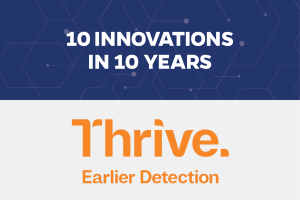
Thrive Earlier Detection was established to revolutionize cancer screenings through liquid biopsy technology. Johns Hopkins University researchers, notably Bert Vogelstein, Ken Kinzler, and Nickolas Papadopoulos, developed CancerSEEK, a test to detect multiple cancer types at earlier stages of the disease. Launched in 2019 with a $110 million Series A, Thrive commercialized CancerSEEK, which would eventually receive a Breakthrough Device designation from the FDA for detecting genetic mutations and proteins associated with pancreatic and ovarian cancers.
In a retrospective study of multiple cancer types published in Science in 2018, CancerSEEK performed with greater than 99% specificity and sensitivities ranging from 69% to 98% for the detection of five cancer types—ovarian, liver, stomach, pancreas, and esophageal—for which there are no screening tests available for average-risk individuals.
The test identifies freely available mutated DNA and cancer-related proteins in the bloodstream. By examining these DNA fragments and protein biomarkers, CancerSEEK can detect the presence of tumors that are not yet visible through conventional methods like CT scans. This capability addresses the current limitation of existing liquid biopsy tests, making CancerSEEK a more effective tool for early cancer detection.
Before Thrive, Vogelstein, Kinzler, and Papadopoulos had a long history of pioneering work in cancer detection. In 2011, they developed SafeSeqS, a gene sequencing technology that could analyze millions of DNA molecules to identify mutations in the bloodstream. This technology was incorporated into a pilot study two years later, using cervical fluid obtained during routine Pap tests to detect endometrial and ovarian cancer. The success of this study led to the formation of PapGene, a startup aimed at commercializing the test, with support from Johns Hopkins Technology Ventures (JHTV) for patent protection, licensing strategy, and lab space. This foundation led the researchers to develop CancerSEEK, which eventually became the cornerstone of Thrive Earlier Detection.
In October 2020, Exact Sciences acquired Thrive in a deal valued at over $2 billion. The acquisition highlights the commercial success of Johns Hopkins University’s innovations and underscores the profound impact of its research on public health. The integration of CancerSEEK into routine medical care has the potential to save countless lives by enabling earlier detection and treatment of multiple cancers.
Thrive Earlier Detection Milestones
- May 2019: Thrive received $110 million in venture capital, leveraging Johns Hopkins technology to aim for routine early cancer screening.
- Spring 2020: The company gained recognition in the genome field, with lab tests during a childhood case of salmonella sparking Isaac Kinde’s interest in screening for DNA mutations.
- April 2020: Thrive released the results of its first study on a multi-cancer blood test, showcasing the potential of its technology.
- June 2020: Thrive raised an additional $257 million to develop its cancer-seeking blood test.
- October 2020: Exact Sciences Corporation acquired Thrive for $2.15 billion, the largest acquisition in Johns Hopkins’ startup history.
- January 2021: Exact Sciences completed the acquisition, creating a blood-based, multi-cancer screening leader.
- May 2021: Thrive’s technology reduced error rates in gene sequencing and detected rare plasma mutations.
- February 2022: The vision of Johns Hopkins inventors for early cancer detection received a significant boost with the $2.1 billion acquisition.